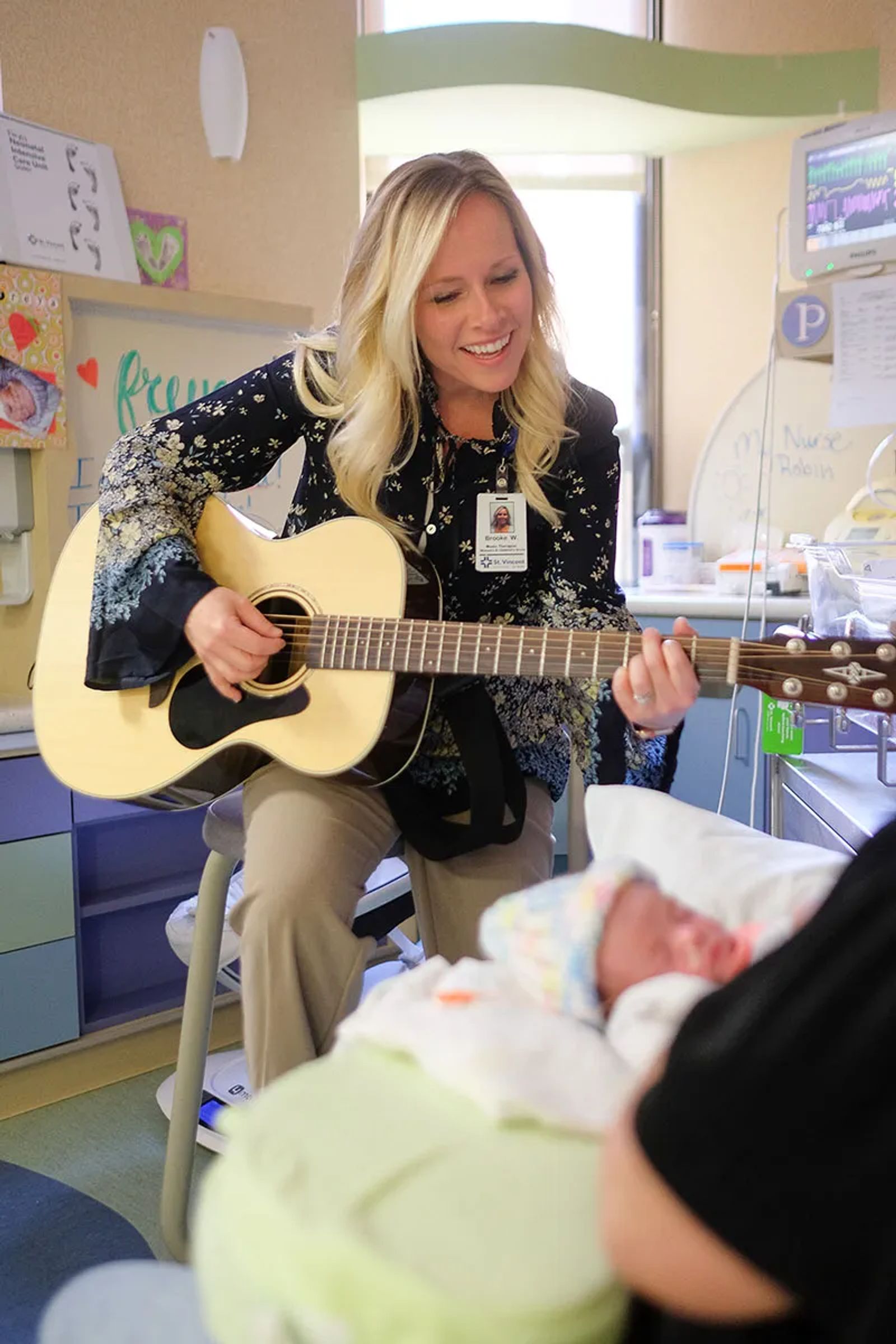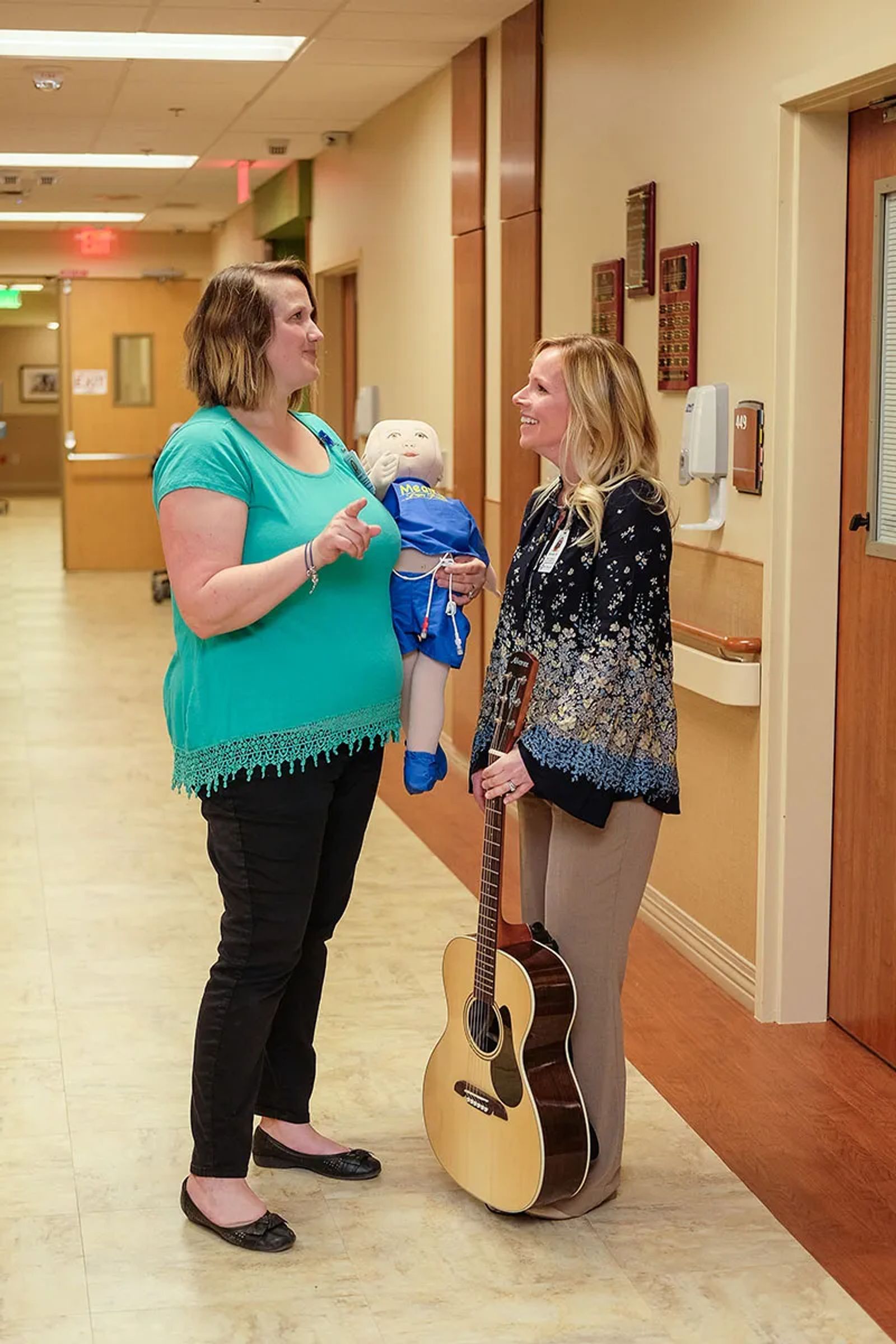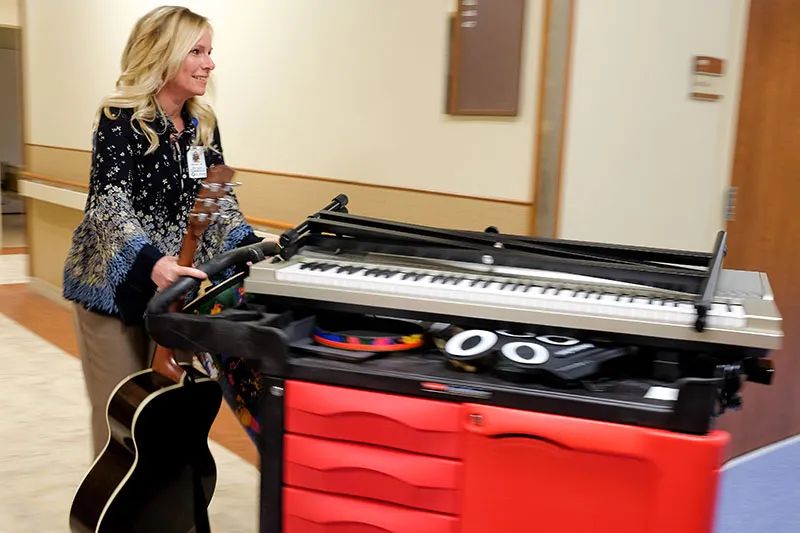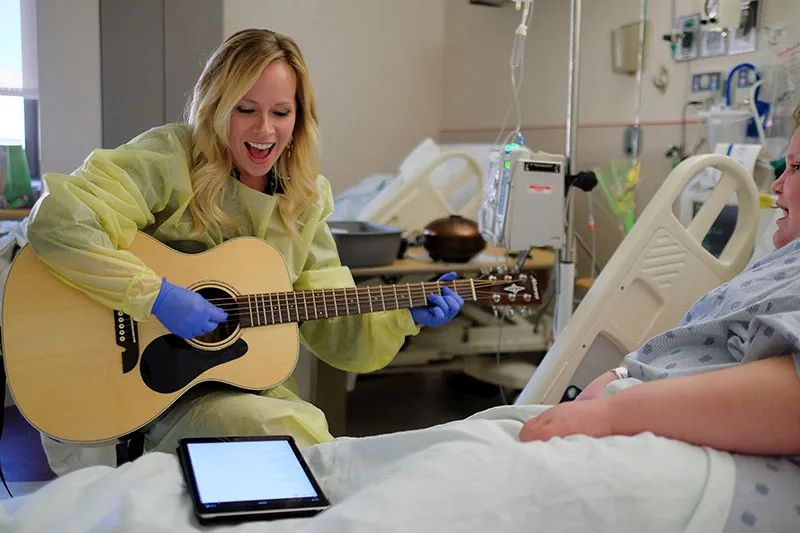
Healing to the Beat
Brooke Wagner brings the sounds of music to Billings pediatric patients
On a quiet morning in St. Vincent Healthcare’s neo-natal intensive care unit, monitors beep, keeping a digital eye on some of Billings’ tiniest residents. In a peaceful corner, Kim Strand sits, cuddling her 19-day-old granddaughter, Freya. The tiny little girl had a rough entry into this world and now her family and medical team are trying to make sure she’s nurtured into a strong and growing infant. As grandma sits with the swaddled little one on her lap, Brooke Wagner, a board-certified music therapist, uses her angelic voice and acoustic guitar to sing the tiny babe a soothing lullaby. As the soft sounds echo in the far corner of the nursery, a monitor shows the baby’s heart and respiratory rate relaxing with each beat of the music.
It’s exactly what Brooke was hoping for when she glances back at the monitor to check Freya’s vitals.
“We respond in a very physiological way to music,” Brooke says. “In the NICU, I can watch that heart rate come down almost as soon as the music starts and the baby hears that voice. It’s amazing to watch.”
Just launched in January of this year, St. V’s new pediatric music therapy program caters to children of all ages. Brooke might help a child cope with hospitalization, offer a distraction during a painful procedure or try to ease the anxiety that a child encounters being away from home. Long before Brooke took the job as the hospital’s first music therapist, she knew in her heart that music is medicine. She knows that even more so today.
“A little one in our Pediatric Intensive Care Unit was having some respiratory things going on and they were having trouble keeping her oxygen saturation levels up. I asked the nurse if I could go in and do a little music with this little one,” Brooke says. “The nurse was hesitant because she knew she wasn’t doing all that well that day. We did a lot of singing, encouraging that deep breathing. I was blowing bubbles. She was blowing bubbles. We were singing a song about it. When I came out of the room, the nurse told me, ‘That’s the highest that her O2 saturation has been all day.’ We saw, in a very physical way, her numbers increase.”
The power of music therapy has also been known to increase circulation, bring a higher threshold for pain, plus cause a drop in stress and anxiety. When the body relaxes and focuses on healing, ultimately it can also shorten the amount of time a person has to spend in the hospital.
“A lot of times what I am trying to do is normalize the hospital environment,” Brooke shares. “When you are a kid, you are supposed to be outside running around playing with your friends. You are not supposed to be in the hospital, tied to monitors.” Once the music gets rolling and a child starts to get in on the act, Brooke says smiles almost always break out. “Sometimes, I will hear, ‘He hasn’t smiled all day,’ but now that we are doing music, he’s smiling.”
The music therapy program within Saint Vincent Healthcare is under the umbrella of the hospital’s Child Life Program. The program has one mission — to make sure that life remains as normal as possible while a child is hospitalized.

Maggie Goldbach, a certified child life specialist, is Brooke’s partner when it comes to helping kids cope. “If kiddos come in and they need to get poked, or have an MRI or surgery, I am there to help explain in their developmental language what’s happening to them,” Maggie says. She uses medical teaching dolls that have IVs or ports already inserted to show a child what could happen to her during the course of their stay. “A lot of times, just explaining helps the child relax.” And, if a child mentions their love of music, Maggie says, “I cannot sing, so if a kiddo tells me, ‘I love to sing’ then I say, ‘You’re going to love Brooke!’” Brooke is quick to jump in and add, “We bring the party!”

If you try to keep up with Brooke Wagner as she makes the rounds several times a week in the pediatric unit, you’ll see quickly that she comes prepared. Her music room on wheels is equipped with not only a keyboard but a guitar, tambourine, a few different drums, a xylophone, shakers and even a ukulele from time to time. Yes, Brooke can play each and every one of these instruments.
“Do you get to choose a lot of things in the hospital?” Brooke asks 11-year-old Chloe as she gets started on her first jam session of the morning. As Chloe shakes her head no, Brooke scrolls through all the sheet music stored on her iPad and asks Chloe to choose their first song. The two agree on “Best Day of My Life,” by American Authors. “You know that one, huh?” Brooke says as she starts to strum on her guitar. Before long, the once shy little girl in a hospital gown is singing a duet with Brooke.

These sounds are more than music to Nichole Miles’ ears. As the hospital’s senior director of Legacy Giving, Nichole was a big factor in getting this program off the ground. “Music has always had a really special place in my heart,” Nichole says. In her early days, she remembers singing with her grandma at church. She was actively involved in the music programs at school and even briefly studied music education. But it was her family history that made her passionate about bringing this program to Saint Vincent Healthcare. Her brother was like many of the children Brooke stops in to visit during her musically inspired rounds.
“My brother was born with a foot deformation,” Nichole says. “Many of our summer vacations were spent going back and forth to the Shriners Hospital in Spokane for my brother to have surgeries.” Nichole adds, “I know how difficult this can be on families and how important it is for these children to feel like kids again.”
When Nichole heard Brooke sing at a nurses’ retirement event and learned she was a board-certified music therapist, it ignited a fire in her to get the program funded and launched.
“Brooke is a ray of sunshine with the voice of an angel. She just has a way of connecting with patients. She can pick up everything from ‘Jesus Loves Me’ to Johnny Cash, and her clinical knowledge is impressive as well,” Nichole says.
Since the music therapy program is funded 100 percent by charitable donations, Nichole has helped some donors witness the magic of this kind of therapy firsthand.

“Every time I see her working with our pediatric patients, it ends in tears a lot of times because it is so moving and so powerful,” Nichole says. “Once people see this in action, it is one of those things that they just get on board with right away.”
While much of what Brooke does is designed to help the body heal, she’s been able to help families heal as well. Armed with a stethoscope that can capture and record a baby’s heartbeat, Brooke uses the recorded beat as the base rhythm for original songs that she gives as a gift to families in her care.
“Just this last month, we had a little one in the PICU and we knew she was going to pass away,” Brooke says. “So, I recorded her heartbeat and turned the sound into a song. I couldn’t bring her back, but I could give the family a piece of her that they could always have.”
WHAT IS A CERTIFIED MUSIC THERAPIST?
Music Therapy is an established health profession in which music is used within the therapeutic mission of addressing the physical, emotional, cognitive, and social needs of individuals. Board certified music therapists must earn a bachelor’s degree or higher in music therapy and complete 1200 hours of clinical work before sitting for their certification exam to earn the title of MT-BC or music therapist – board certified.













